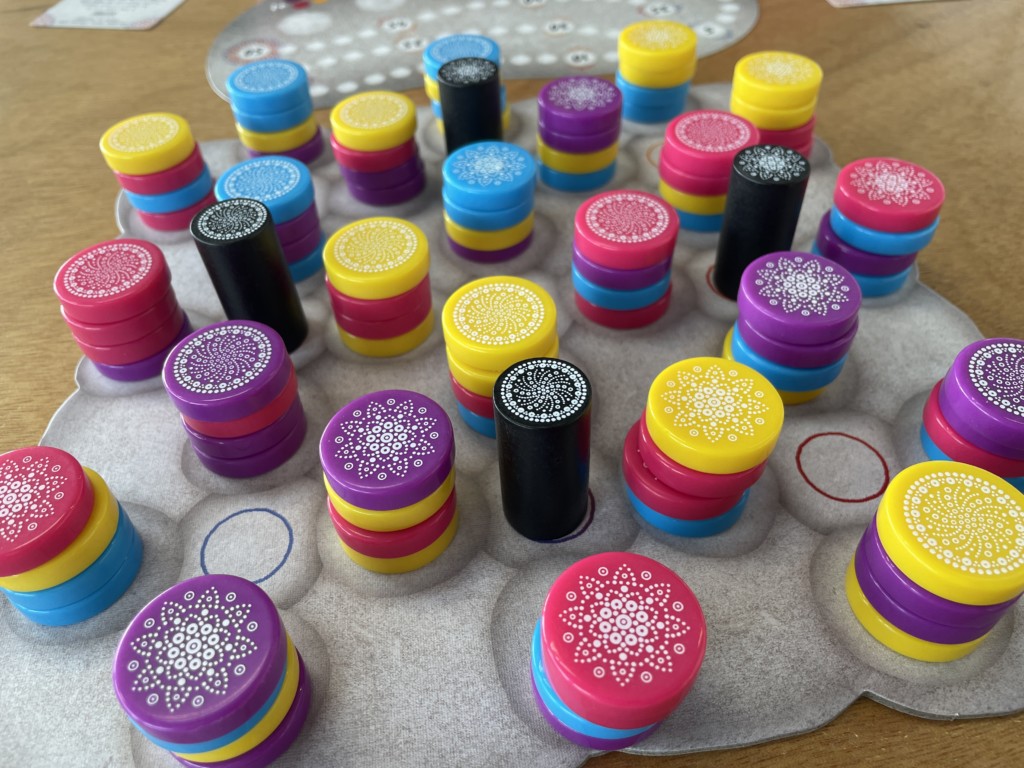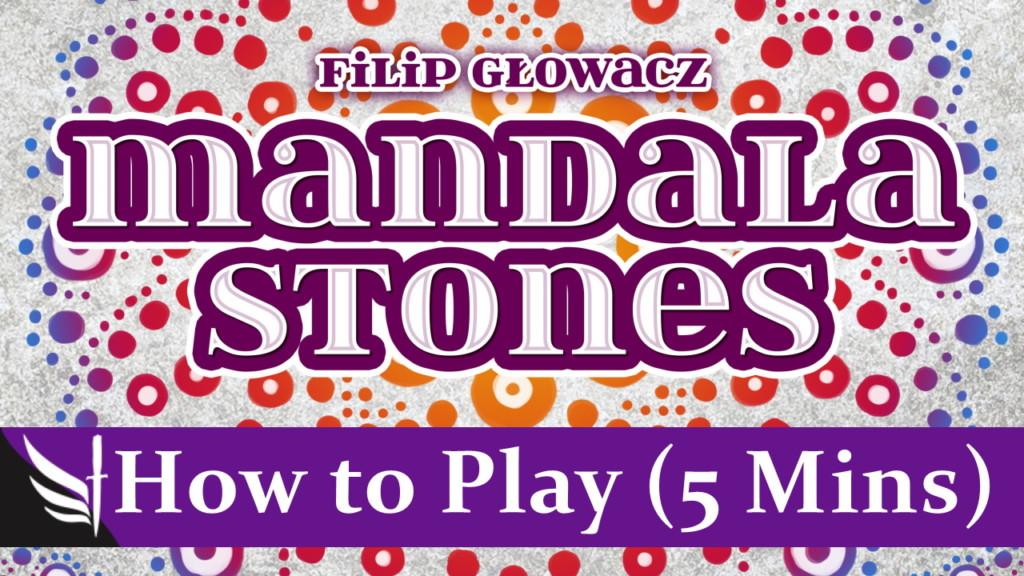Mandala Stones is an abstract game of picking stones and scoring them.
Is it as relaxing as the game’s aesthetic suggests?
You use artists to collect colourful stones in towers that you then score.
How to play Mandala Stones
This is a brief but comprehensive overview of how to play Mandala Stones covering all of the gameplay rules.
Theme
If you haven’t guessed already this is an abstract game with Mandala Stones the reason the stones exist, purely that they’re so photogenic?
This could have been anything, something more fun or at least more mainstream appealing.
Setup & Rulebook
Setup is fiddly stacking the 96 stones into piles of 4, 26 times without knocking one over. This can be tricky and boring but do what I do and “Check some rules in the rulebook” while some other sucker does this for you 😉
Set up of this game is simple, board wise put the big one in the middle, the next biggest just to the side and everyone gets a very flimsy player board.
The spaces for the big dobber artists are all completely different colours so you can’t tell the 4 starting spaces just by looking, not helpful
The rulebook is pretty decent, no complaints here.
Components & Artwork
The stones are nice, thick plastic like Azul and obviously look great. They’re pretty but don’t look good enough to eat which is a perfect balance to have. There are only two patterns but they’re very similar so it can be hard to make them out sometimes depending on lighting etc
The main board and the Mandala board are OK, clear to read and nice and thick. The player boards are flimsy and have the players scoring token on so would have liked to have seen these be double layered.
There isn’t really ‘art’ as such. There are two patterns repeated and the rest is just the colour of the pieces. I do like how the mandala board swirls outwards just like a painted mandala stone, it’s very pretty

Ease of Teaching & Accessibility
It’s easy to teach. You have, “Pick or Score” if Score then “Score 1 or Score 2”. Those are the choices. The hard part is saying pick a start stone then gather them in clockwise order but don’t stack them in that order, it’s weird.
Mandala Stones Summary
The rules for picking up stones are odd. There is a rule, then another rule, then a system to picking them. From those available, you pick a starting stone and take them in clockwise order. You then create a stack with the first taken on the bottom.
But of course, if you pick them up and stack them in order one-handed like most people do the first will stay on top so I was taking them anti-clockwise starting from the last stone. It makes it easier than picking them up one at a time
Picking can take time with a bit of AP. Sometimes you know what you need, say a stack 3 high with a yellow stone on top and you’re looking for it, you just need to find how to get that, if it’s even possible. Slowing the game down is the Five Tribes effect where the board state changes too much before your turn so you can’t really plan too much.
So be careful who you play with and don’t play with that person you know who, THAT person, if you don’t know that person, you’re that person
Scoring
Now, this is interesting. Scoring the top stones is easy as quite often you may score them just to get a few easy points as well as the odd bonus point from the mandala board. It’s usually not the most optimal way of scoring but if it takes 2-4 points of the person to your left then it’s usually worth it. Also, taking those stones off the top of some towers can set up the other more profitable scoring type.
Do not underestimate how hard getting a tower of 4 is. The odds of all 4 stones having the same pattern AND none of them being next to another artist is quite rare I would think. I’ve never seen it.
So overall it is a nice game but it’s far from relaxing as the theme would suggest. It’s not as stressful as an Azul when you can see what you need and you’re hoping no one takes it before your turn, that’s too much for me. I mentioned Five Tribes too and this is much less stressful and a lot lighter so that’s nice.
Jesta ThaRogue
Note: The copy played was a review copy generously provided by Board & Dice, big thanks to them for this game.



Leave a Reply